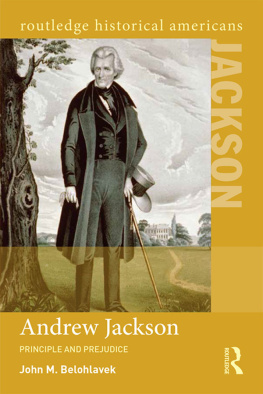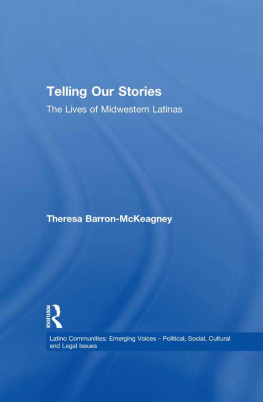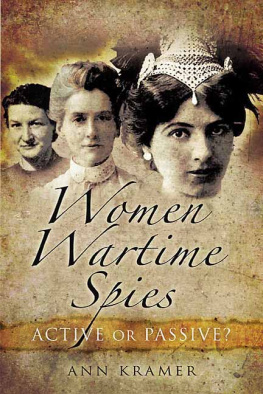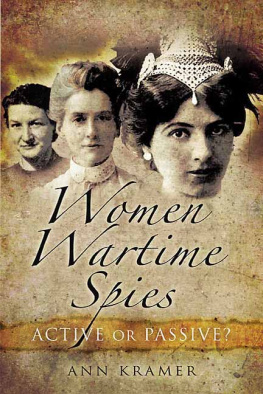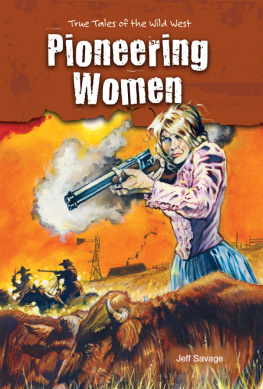University of Virginia Press
2017 by the Rector and Visitors of the University of Virginia
All rights reserved
Printed in the United States of America on acid-free paper
First published 2017
ISBN 978-0-8139-3990-2 (cloth)
ISBN 978-0-8139-3991-9 (e-book)
1 3 5 7 9 8 6 4 2
LIBRARY OF CONGRESS CATALOGING-IN-PUBLICATION DATA is available from the Library of Congress.
Cover art: La Mantilla, hand-colored lithograph by Carl Nebel, 1836.
ACKNOWLEDGMENTS
The study of womens history presents a unique set of opportunities and obstacles. Exploring the lives and contributions of women on both sides of the Rio Grande, most of whom left little in terms of letters or diaries, added yet another challenge. If I have done them justice, that success is in significant part owing to the scholarly assistance and suggestions made by Sidney Bland, Doug Egerton, Julia Irwin, Nat Jobe, and Gary Mormino. Their thoughts on various aspects of the manuscript have improved it immeasurably. I would also like to thank the anonymous readers for the University of Virginia Press, who strengthened the volume by recommending worthwhile additions and deletions, Joanne Allen and Morgan Myers for their keen-eyed copyediting skills, and Dick Holway, my editor for this volume, for his unflappability and counsel.
Numerous archives and libraries, including Historic New Orleans, the Dallas Historical Society, the US Military Academy Library at West Point, LSUs Hill Memorial Library, Special Collections, and the Collections of the University of Texas at Arlington, demonstrated the cooperation and professionalism valued and welcomed by the historian. My colleagues at the University of South Florida expressed their ongoing concern and support for this study, while my wife, Susan, demonstrated endless patience and offered stylistic advice that has made the narrative more readable. To each of them I owe a debt of gratitude. They should share in the credit but assume none of the criticism that may be forthcoming of this work.
Introduction
On a cold February morning in northern Mexico, a stinging rain pelted Lola Sanchezs face, awakening her to the drudgery of yet another day with the army of General Antonio Lpez de Santa Anna. Lola battled the harsh elements for weeks. Her bare feet were bruised from stones on the road, and her arms ached from carrying the cooking pot and a few paltry possessions. With little clothing and no shelter, she survived by hard work, pluck, and no small measure of good fortune. Would Lola find dry firewood? Her desperate search must be successful, for how else would she prepare a breakfast of atole or tortillas? The backbreaking labor, danger, and monotony seemed worth the sacrifice, for she loved her country. Jos, her husband, slogged along with the Mexican forces, which depended upon women such as Lolathe soldaderasfor sustenance and medical care on the march. These women were the spine of the army.
A thousand miles away in Indiana, Nancy Conner rose before dawn to light the carefully arranged logs in the fireplace, removing the dank cold from her cabin. She prepared breakfast for her two young daughters, brown bread washed down by fresh milk. Pedestrian fare indeed, but filling and inexpensive. The sun rose quickly in the winter sky, so that Nancy could not waste time entertaining the children. Caleb, her spouse, had enlisted in the volunteers in 1846, to defend his homeland and supplement the family income. In his absence, Nancys Victorian domestic duties expanded dramatically. The labor and loneliness took a toll, and depression left its mark. What if Caleb never returned?
Lola Sanchez and Nancy Conner were not alone. They symbolized thousands of Mexican and American women, for too long voiceless and invisible, who sacrificed for family and nation. This volume offers that voice by exploring various aspects of the war experience. It ranges widely in an effort to address the struggles and concerns of American women at home, often divided and passionate in their defense of the war or opposition to it. They joined groups that patriotically aided the soldiers by providing clothing and flags. Others expressed their reformist views by speaking and writing tracts that condemned the conflict as immoral and unjust. The same split separated pioneering women journalists, such as Jane Swisshelm and Jane Cazneau, who interpreted the war quite differently in their widely read newspaper columns.
Many women channeled their drive and intellect into the popular culture, composing songs, poems, and plays that captured the hearts and minds of a nation. A smaller number of American women found themselves in Mexico by circumstance, laboring in local factories or traveling with the military. Sarah Bowman became a legend, transitioning from army cook to entrepreneurial hotel owner and madam. A youthful Susan Magoffin suffered the perils of the Santa Fe Trail, while Ann Chase endured the unique challenges of managing her husbands business in Tampico. Both Magoffin and Chase kept extensive diaries revealing their personal strengths and resolution, as well as the dangers each faced.
The narrative also focuses on Mexican women in a similar if not parallel context. They too supported the war through the writing of songs and poems, but more impressively, they traveled with their armies. The soldaderas provided essential support. Theirs is a tale of courage, heartbreak, and endurance. The conflict sometimes placed Mexican women in a position of opportunity. Gertrudis Barcel evolved from a Santa Fe gambler of questionable reputation to Doa Tules, businesswoman and one of the towns wealthiest citizens. Other Mexican women worked for the US Army as it occupied the country, but some found that employment came at a high cost. Women became the objects of male fantasy, which frequently resulted in exploitation and violence.
While the stories of celebrated individuals such as Swisshelm, Cazneau, and Chase, who agitated against the war, promoted expansion, or spied for the Americans, have received scholarly attention, their lives and contributions have been largely marginalized in Mexican-American War scholarship. These women flaunted Victorian conventionality but did not rival Barcel or Bowman, mistresses of thriving saloon and gaming establishments. This work seeks to explore and recognize the courage, spirit, and influence of women heralded and unheralded, of varying backgrounds and nationalities, who powerfully impacted the war that changed the continent.
The Social Worlds of the United States and Mexico
In 1846, two profoundly different societies eyed each other suspiciously across the Rio Grande. Both struggled economically and were fraught with political turmoil. One, however, appeared ambitious and on the move; the other, equally ambitious and in disarray. The United States and Mexico had never clashed. The fledgling republics shared a common border but not a common culture, language, or religion. Moreover, Mexican possessions in the Southwest formed a clear obstacle to US expansion. Given the distinctive points of separation between the countries, the question might be raised whether the war that occurred from 1846 to 1848 was a foregone conclusion. If so, who determined whether that western territory would be acquired peacefully or by force of arms? Was this conflict avoidable, or was it the inevitable product of the evolution of two societies at odds and the entrenched attitudes and goals of their leaders?


